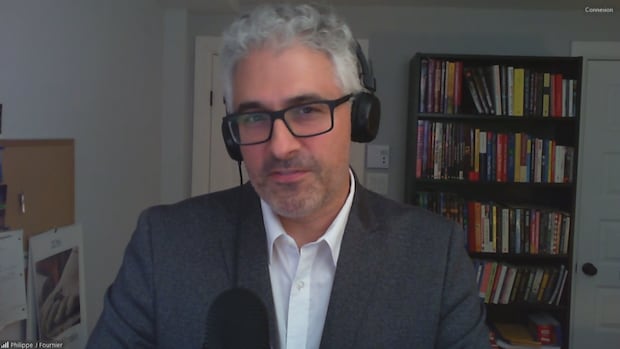The upcoming Toronto-St. Paul’s federal byelection will be a critical test for Prime Minister Justin Trudeau and his party — a bellwether indicating how the party is faring in an area of the country where Liberals have performed well for decades.
CBC News spoke to 15 voters in the riding to gauge support for the incumbent party and to learn more about what’s motivating people at the ballot box.
While the June 24 byelection is being held to pick a new MP for Toronto’s midtown, some voters are treating the summer vote as a referendum on Trudeau’s time in power.
All of the voters who spoke to CBC, including past and current Liberal supporters, said Trudeau should step down as leader if the party loses this Toronto stronghold.
“I think Mr. Trudeau will be quaking in his boots very soon because — it’s just time. It’s time for a change,” said Erica Bertucca, who was among the first in line to vote at the historic Timothy Eaton Memorial Church where Elections Canada held one of its advance polls.
Pointing to the steady stream of voters who shuffled into the polling station after it opened on Friday, Bertucca said the relatively strong turnout was a sign that voters are motivated to turf Trudeau.
“That’s what everybody behind me in line was talking about — time for a change,” she said.
Elections Canada said 10,787 ballots — an estimated 12.75 per cent of the riding’s registered electors — were cast in the advance poll last weekend.
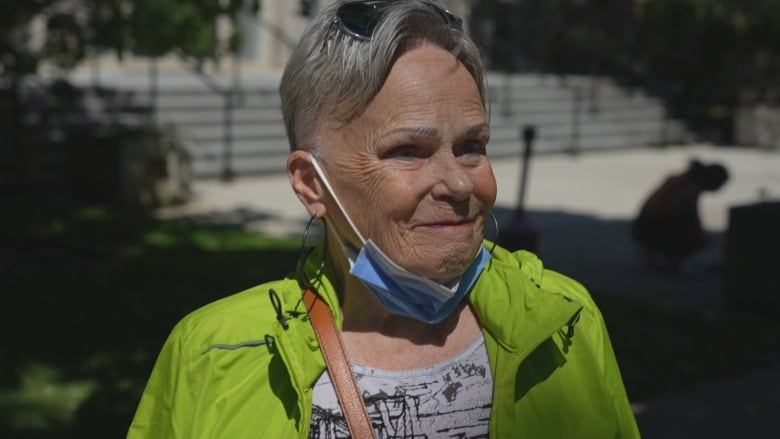
But that doesn’t mean everyone is sold on Conservative Leader Pierre Poilievre.
Some disaffected Liberals said they still plan to back their party’s candidate in this byelection — former Parliament Hill staffer Leslie Church — because they’re uneasy with Poilievre and what he has planned for the country if he forms a government.
Some voters described Poilievre as “irresponsible,” a “negative” leader who doesn’t offer many solutions, someone who’s “rough around the edges” and a “populist” who uses “dog whistles” to speak to a right-wing base.
Others said Poilievre is the leader best positioned to take the country in a new direction after the perceived failures of the Liberal government.
Toronto-St. Paul’s, which has been held by the Liberals for more than 30 years, is one of the safest seats in the country for the governing party.
Former long-time Liberal MP and cabinet minister Carolyn Bennett, who carried the seat even during the party’s historic low point in 2011, won by more than 20 points in the last federal election.
But Church, who moved back to Toronto after years working for the government in Ottawa, is now in a pitched battle against Conservative Don Stewart to keep the seat in the Liberal column.
CBC News asked Church if voters raise Trudeau fatigue when she’s out knocking on doors.
“I do hear that a lot,” she said.
“I think that’s pretty natural for this point in time. We hear that the prime minister is, you know, he’s been out in front for a number of years and people have been through a lot.
“I also am hearing a lot about the alternatives. I think people are really deeply uncomfortable here with Pierre Poilievre — they’re worried about that brand of politics. They don’t like it.”

Philippe Fournier, a poll aggregator with 338Canada, told CBC News the riding is winnable for the Liberals but the margin could be razor-thin, given just how far the party has fallen in the province.
Poilievre’s Conservatives enjoy a 15-point lead in Ontario, according to Fournier’s data — which could spell trouble for the governing party even in previously rock-solid Liberal ridings.
If the Liberals can’t win a supposedly “safe” seat like this one, it raises questions about the party’s general election chances, Fournier said.
And a Conservative victory in St. Paul’s would be a major breakthrough — the party hasn’t won a seat in urban Toronto since 2011, he added.
Voters head to the polls in Toronto-St. Paul’s in a federal byelecton, June 24. 338Canada poll aggregator Philippe Fournier breaks down the numbers.
Many voters who spoke to CBC News said the Liberals’ nearly nine years in power haven’t been all bad by any means — they’re just yearning for new leadership.
A poor performance in this byelection should be Trudeau’s cue to leave, some voters said.
“I think that most politicians who serve two terms should step down,” said Shirley Zussman. “I’m not saying Trudeau’s done a lousy job on everything but … I had a hard time making a selection this year, I’ll put it that way.”
Barbara Reid said she voted Liberal again because Poilievre and the Conservatives are “so negative” and “so unhelpful” and she thinks they routinely talk down Canada — a country she said she’s proud to call home even though its has its challenges.
“I’m going with the people I know opposed to the person who scares me,” she said. “I won’t vote for anyone who’s policies seem to be, ‘Burn the house down.'”
But Reid’s not sure if Trudeau is the right person to lead the party anymore.
“I think there’s enough negative baggage around Justin Trudeau and he really should be listening to the drumbeat,” she said.
“He should really seriously contemplate passing the baton at this point while there’s still time for a new leader to gain some traction before the next general election.”
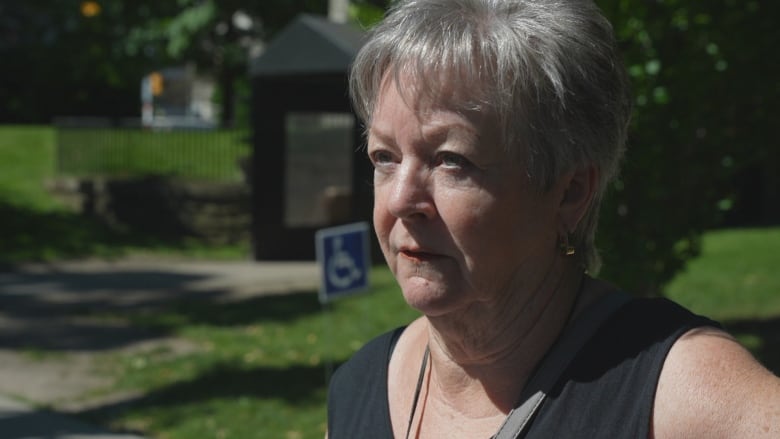
Garth Myers, a father of two young daughters, feels the same.
“If the Liberals lose, if Leslie Church loses, then that’ll be the end of Trudeau,” he said.
“I think they’re going to get devastated in the next general election if Justin stays at the head of the party, and I think that will be a shame for everybody that’s on the political left in this country.
“Speaking for myself, I think it’s time for a change at the top of the Liberal Party. I don’t think it’s time for a change in the government.”
Marilyn Lazar has voted Liberal in the past. She said she couldn’t bring herself to vote for Trudeau this time around.
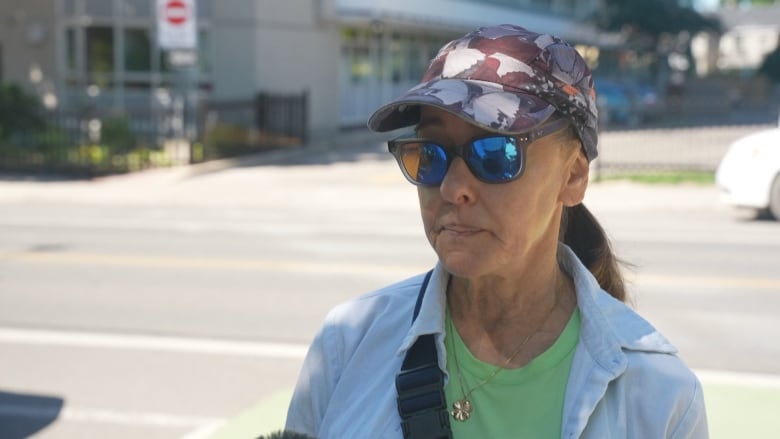
She didn’t point to any particular reason for quitting Trudeau but said his government has made “foolish” decisions.
“I don’t consider myself a conservative person,” she said, citing her support for gay marriage, abortion and the environment.
“I just think Justin Trudeau needs to go. If the Liberal Party had a different leader, obviously, it would be a different story. So, with Poilievre, I have to count on him to change direction.”
Another common theme in Toronto-St. Paul’s is frustration with the state of the economy — GDP per capita is shrinking, productivity is low and a new capital gains tax hike could make the business investment climate worse, some voters said.
The cost of living crisis and a housing affordability crunch have also made the Liberals less appealing, voters said.
“I’m very eager for change,” said Christina Eaton, whose ancestors helped build the stately United Church that now doubles as a polling station.
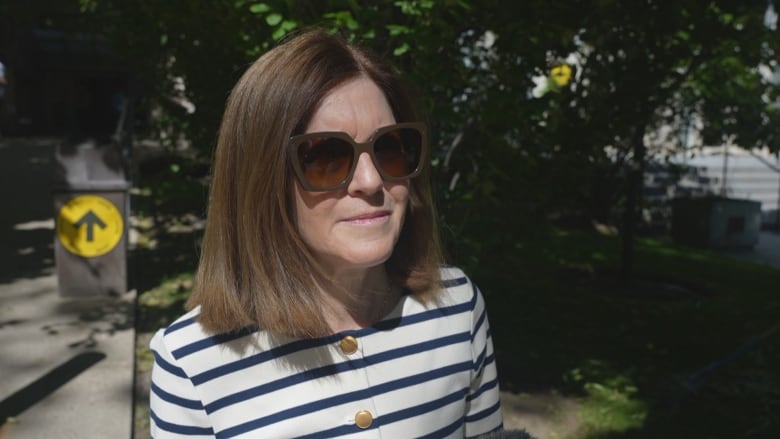
“Trudeau’s overspending and he’s spending in all the wrong areas,” she said. “Poilievre — I like him, he’s common sense and I think we need that right now.”
Church’s pitch is that, while things haven’t been perfect, the Liberal government has accomplished a lot and it’s prepared to do even more if it’s given a renewed mandate.
On Trudeau’s watch, the government has lifted some 650,000 kids out of poverty with the Canada child benefit, rolled out big-ticket transit funding to alleviate chronic congestion and pushed through enhancements to the Canada Pension Plan that will make payouts more generous for future retirees, Church said.
Church touted the nascent national child care program, which has the potential to get hundreds of thousands of kids into $10-a-day spots — a big saving for Toronto-area parents who pay some of the highest child-minding fees in the country.
The Liberals also have an ambitious program, detailed in the most recent federal budget, to build tens of thousands more homes to restore affordability, she said.
All of those programs could be at risk if the Conservatives win, Church said, because Poilievre is all about “scorched-earth politics.”
Church concedes there’s been some resistance to the message from voters who are sitting on the fence.
“People feel the cost of living, they’re frustrated, they’re cranky,” she said.
Asked about the party’s poor standing in national surveys, Church said, “I’m not really focused on the polls.”
“I think that when it comes to actually marking a ballot, when it comes to making a choice, people are thoughtful,” she added.
“I’m going to keep doing what I’m doing, which is having conversations one by one, door by door, putting in that hard work to make sure that people understand that choice, to understand the positive plan that we’ve put forward.”
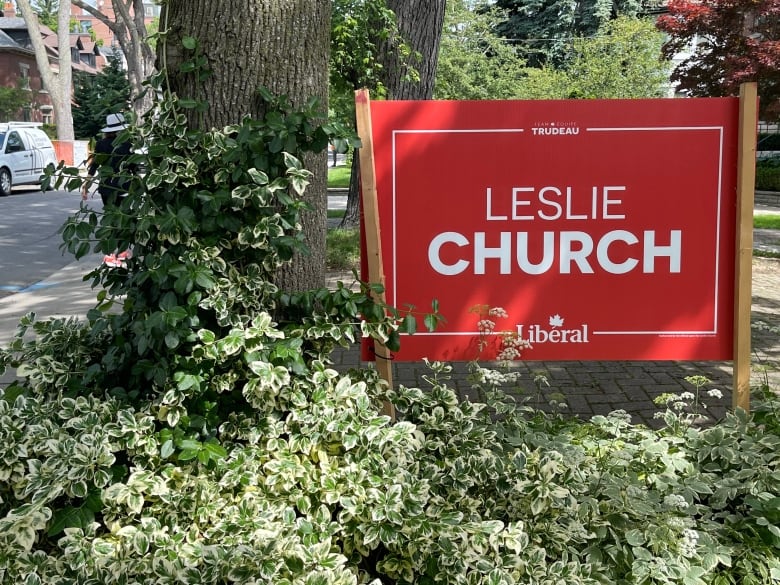
There are indications that the party is not leaning as much on Trudeau as it may have in the past.
The phrase “Team Trudeau” is printed in small font on Church’s lawn signs — difficult to see from a distance.
Church’s Conservative opponent, Don Stewart, a former associate of Poilievre’s senior adviser Jenni Byrne, would not agree to an interview.
Speaking briefly to CBC on the street outside his campaign office, Stewart would only say he’s been busy door-knocking and he’s focused on building up his team ahead of election day.
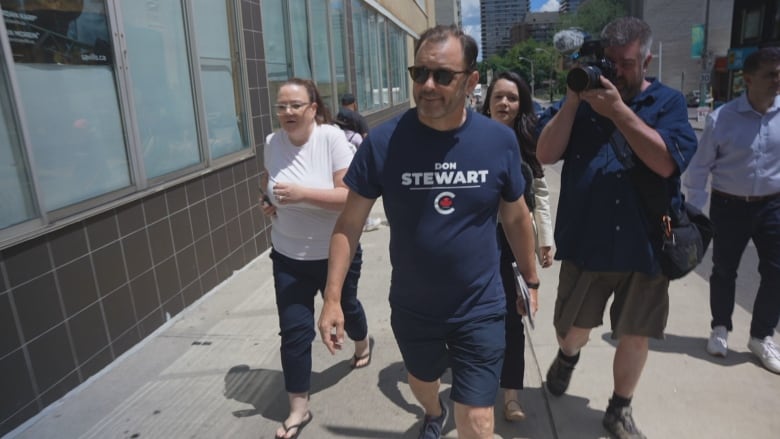
Toronto-St. Paul’s resident Sharon Maloney said she won’t vote for the Conservatives because they don’t have much of a plan to tackle climate change.
“I might have considered change, but that kind of change is not an option,” Maloney said.
She said Trudeau should do some soul-searching about his future if the Liberals lose the seat.
“I think it would be difficult for him to stay on,” she said.
“The Liberals have been there for a long time and I believe in the old adage that it’s not the other party that wins — it’s the outgoing party that loses. There is that desire for change.”
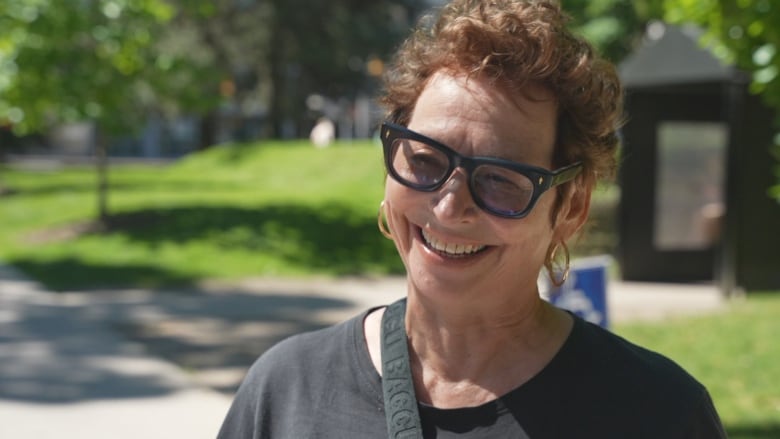
Toronto-St. Paul’s is also a riding with a sizeable contingent of Jewish voters — they make up about 11 per cent of all voters in the riding, according to Elections Canada data from 2019. Only four other ridings nationwide have more Jewish voters.
Trudeau’s popularity among some Jews has taken a hit because of the Liberal government’s position on the Israel-Hamas conflict, which has been less supportive of Israel than some would like.
The government backed an NDP motion that demanded a ceasefire in the conflict, criticized the Israeli government’s conduct in the war and vowed to hold back some arms exports to the country — policies that led a prominent Jewish Liberal MP to consider leaving the caucus.
There’s also a feeling that the Liberal government hasn’t done enough to crack down on the antisemitism that’s reared its ugly head since the Oct. 7 attack on Israel and the resulting war in Gaza.
Toronto-St. Paul’s voter Beth Stephens said Poilievre “recognizes and respects Jews as human beings,” while the Liberals haven’t been as supportive of the community as they have been in the past.
“A lot of the Jewish community — they usually vote Liberal/NDP but a lot of things have changed. People have been left hanging, feeling abandoned and they are feeling unsafe. They’ve had to take their mezuzahs down off their door frames,” Stephens said, referring to the piece of parchment often hung by Jews near the front doors of their homes.
But Stephens’ friend, Lynda Friendly, is thinking differently.
“I will be voting for Leslie Church. I am scared shitless — if I can say that — about Pierre Poilievre. He’s a mini-Trump. He cannot be trusted. And he’s a bad actor,” she said.
